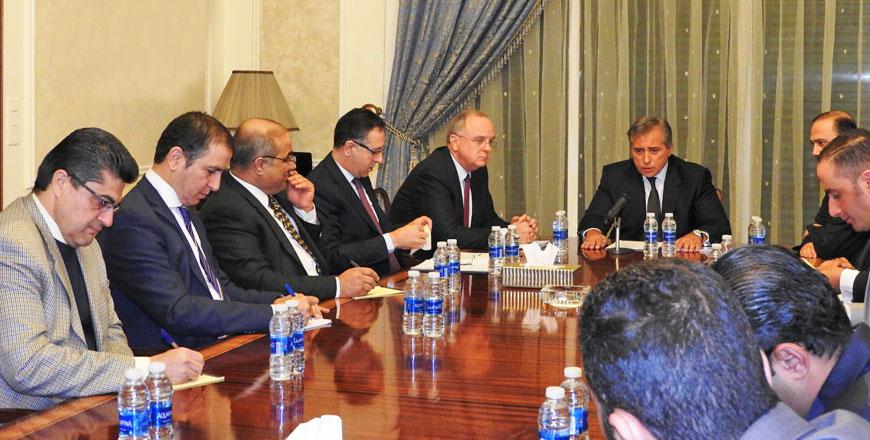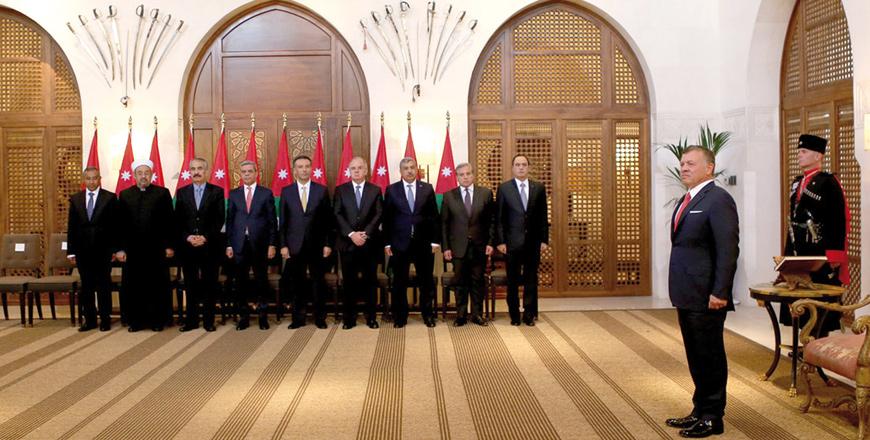You are here
Going back on economic reforms not an option — deputy premier
By Ahmed Bani Mustafa - Mar 26,2018 - Last updated at Mar 26,2018

Deputy Prime Minister and Minister of State for Economic Affairs Jafar Hassan talks to media leaders and reporters in Amman on Sunday (Photo by Ahmad Bani Mustafa)
AMMAN — The government’s economic team will be working to implement reforms, programmes and projects agreed upon and reflected in the economic growth stimulation plan, Deputy Prime Minister and Minister of State for Economic Affairs Jafar Hassan said on Sunday.
Hassan stressed the importance of the economic reform process, emphasising that its absence would widen the budget deficit and, consequently, add more burdens on Jordan and Jordanians.
Addressing a meeting with editors-in-chief of local newspapers and media outlets on Sunday in the presence of the government's economic team, the deputy prime minister stressed that the economic reform programme was highly needed to ensure that the present economic woes are not left for governments to come. If left for a later stage in the future, these economic woes might become “unsolvable”, he stressed.
Hassan outlined the government's efforts to stimulate the national economy in line with the reform plan that aims to reduce the deficit in the state budget and the debt-to-GDP ratio through various measures, such as increasing national exports and improving accessibility to foreign markets.
At the meeting, attended by State Minister for Media Affairs Mohammad Momani, Labour Minister Samir Murad, Industry, Trade and Supply Minister Yarub Qudah and State Minister for Investment Affairs Muhannad Shehadeh, Hassan warned that " time is not on our side,” acknowledging that people and production sectors are passing through tough times.
This situation, he said, prompts the ministerial economic team, which he heads, to work in accordance with a comprehensive programme and in line with a unified vision so as to effectively achieve progress in implementing growth-focused plans in parallel with the financial reform programme that has been undertaken".
Hassan added that the rise in public debt and debt service will be at the expense of the budget’s ability to pay for basic services and current expenditures, and its cost on citizen will be “worse” than it is now if the goals of the correction efforts are not realised.
The deputy prime minister stressed that the financial reform programme had begun with basic and difficult reforms rather than transferring the current crisis, with its heavy weight, to future governments, making them become “intractable and even impossible”.
The reform plan is the only path for addressing the economic challenges that the Kingdom has been facing due to various reasons, foremost of which is the energy bill of JD5 billion a year, after the suspension in Egyptian gas supplies, the minister said.
He pointed out to other costs Jordan bears, which have surpassed the amount of assistance provided to the country, including the Syrian refugee crisis and the slow growth of production due to regional volatilities over the past seven years.
Despite these circumstances, he said: “We are able to change course, and we have no choice but to do so, as His Majesty King Abdullah has stressed the need for self-reliance in solving our problems.”
He said that the public debt’s ratio to GDP, which reached 94.4 per cent last year, would have been much lower — around 75 per cent — had it not been to the impact of regional turmoil.
The public debt has increased by 42 per cent over the past eight years and the debt service increased by JD460 million annually in the same period, Hassan said, adding that this year, the government managed to freeze the ratio, noting that Standard & Poor’s (S&P) has, as a result, kept its B+/B credit rating to Jordan unchanged.
On investment, the minister said the government has taken various measures to improve the business environment such as easing visa procedures for a number of restricted nationalities.
The deputy prime minister underscored a number of pieces of legislation in the making that would help stimulate the economy and attract investments.
The laws under consideration are related to medical malpractice, moveable assets, security, bankruptcy and insolvency, labour and customs, he noted.
On the draft law to amend the Income Tax Law, Hassan said that it aims to increase the efficiency of tax collection and deal harshly with tax evasion, which, he said, harms all.
Under the reform plan, the government will work on improving the quality of public services by implementing the Strategy for the Development of Human Resources , said Hassan.
“Improving the quality of public education, transport and health will ease some economic burdens on citizens, especially the middle class, who now resort to private schools and hospitals,” said the minister.
For his part, Qudah said that the role of the private sector in the partnership with the public sector should not stop at offering counsel to the government.
Qudah called on the private sector to exert more efforts in exploring new markets for Jordanian exports and be more involved in the government’s plans, programmes and delegations visiting other countries.
He underscored, for example, the reluctance of some private sector representatives to participate in visits to East Africa to help government efforts to open new markets to Jordanian products.
The minister highlighted the government’s efforts to reduce the risk of penetrating new markets.
Qudah pointed out that the reopening of the Turaibil border crossing with Iraq at the end of last year has led to a substantial rise in Jordanian exports to the neighbouring country.
In order to reduce the financing costs in Jordan, he explained that through two programmes, the government has provided JD100 million to guarantee the loans and JD200 million to be lent through commercial banks at an interest rate not exceeding 4 per cent, with repayment periods of up to 10 years and grace periods of up to two years.
Since the reopening of the crossing late last year, Jordanian drivers have had to unload their trucks at the crossing for Iraqi vehicles to take the consignments to their destinations inside Iraq, a situation, he announced, that would end today.
Qudah also stressed the importance for Jordan to transform into a productive country rather than a consuming one, and to encourage unemployed Jordanians to occupy jobs taken by foreign labourers. On this note, he said that remittances by Jordanian expatriates are about JD2.7 billion, which remittances by foreign labourers working in Jordan from only one nationality are estimated at JD1.7 billion.
State Minister for Investment Affairs Muhannad Shehadeh said that investment flows grew by 19 per cent in 2017 compared to 2016, and the number of companies that benefited from the Investment Commission’s Law grew by 3 per cent last year.
“We are aware that this progress is not enough to achieve macroeconomic growth in general,” he acknowledged.
He noted that the government realises that the costs are too high for the industrial sector but at the same time things should be seen as part of the bigger picture of reform, which, he said, is not built on one specific sector. He stressed that the government is keen to stimulate growth in all sectors such as the industry, tourism and services.
He said that the volume of foreign investment attracted last year reached JD1 billion across several sectors, mainly industry and services.
He commended the decision to remove restrictions on visas for Indian tourists, noting that are 23 million Indian tourists travel abroad every year, with this figure expected to rise significantly.
For his part, Labour Minister Samir Murad stressed the importance of the Labour Law as it enhances the relations between the three production pillars (the government, employers and labourers).
On matching education outputs with the labour market’s requirements, the minister pointed out that the National Strategy for the Development Human Resources focused on this matter, noting that a higher council will be formed to regulate the vocational and technical education in the Kingdom.
Murad stressed the existence of an imbalance in the educational institutions’ outputs proved by the number of university students in the Kingdom, which is 333,000, compared with 15,000 who are trained at vocational and technical centres.
Related Articles
AMMAN — A Royal Decree was issued on Sunday approving a reshuffle in Prime Minister Hani Mulki’s government.The shakeup, which came upon the
AMMAN — Amman Chamber of Commerce (ACC) President Issa Murad on Sunday expressed the private sector's appreciation for the recent government
AMMAN — Prime Minister Hani Mulki and 22 ministers were on Friday in a conversation with 150 young people representing all the Kingdom’s gov
















